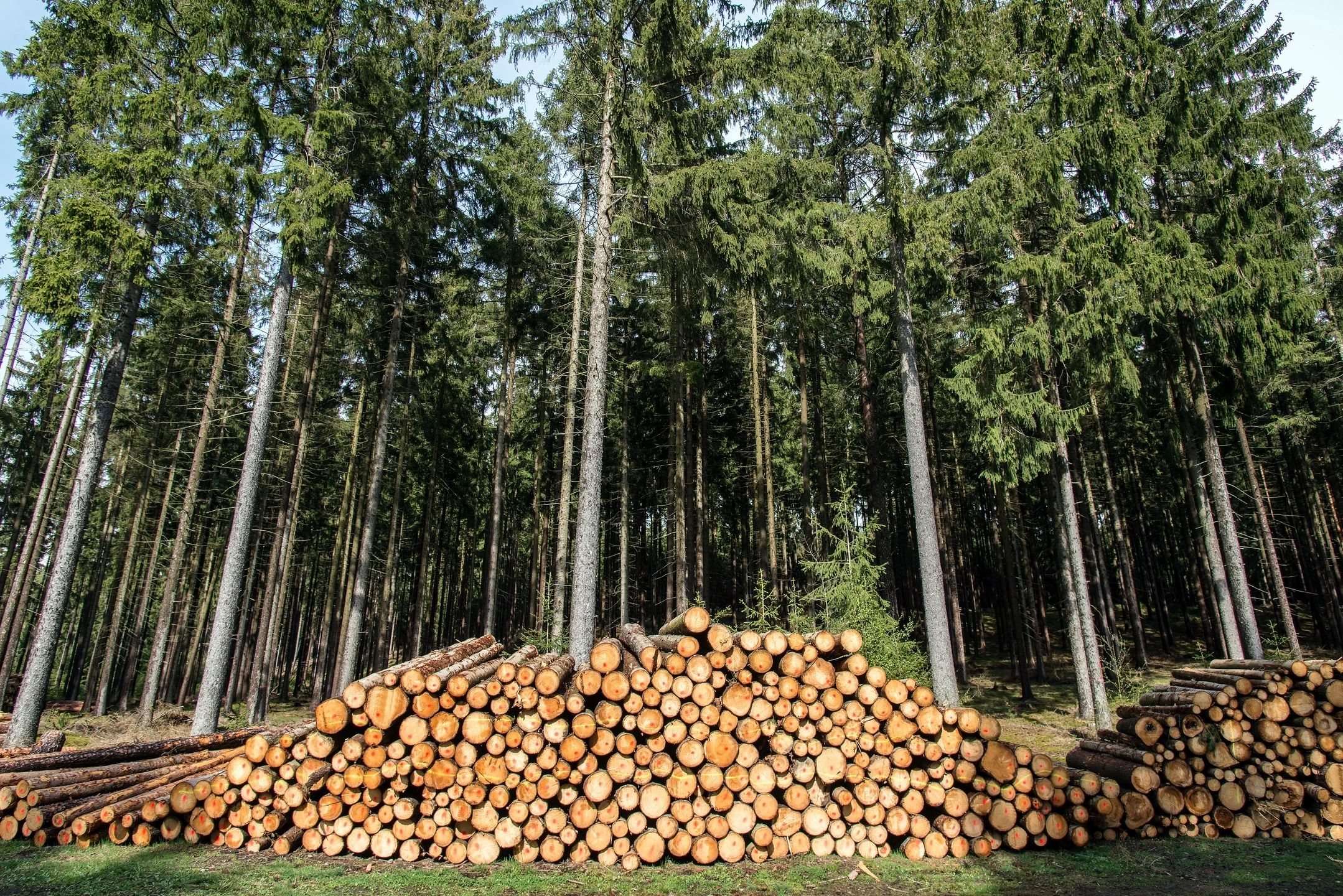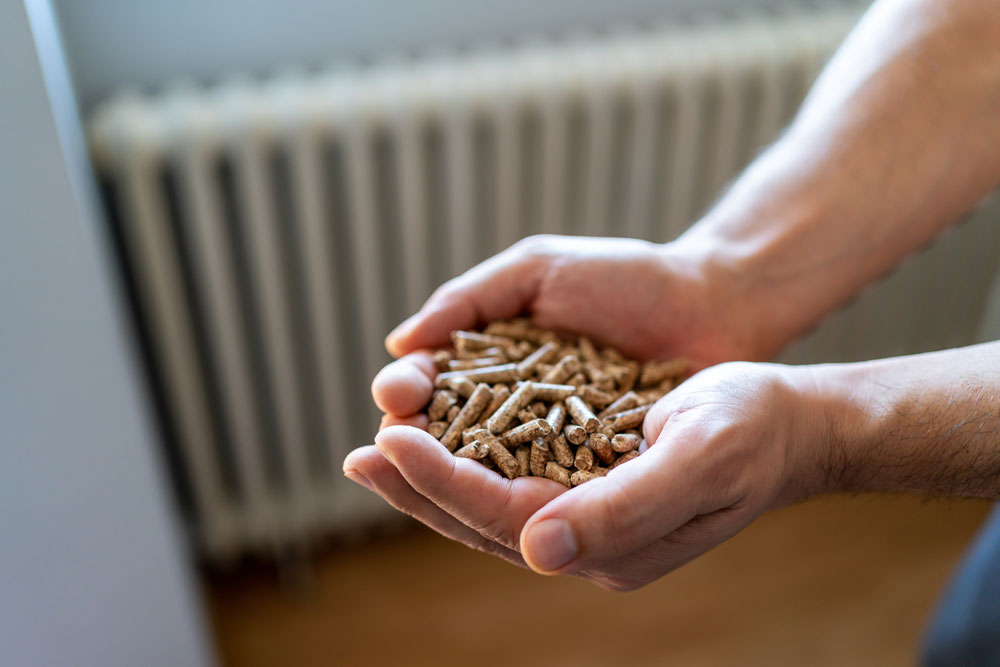Pellet Heating is a Climate Strategy with Short- and Long-Term Benefits

Maine could substantially reduce CO2 emissions created by fossil fuels for building heat in Maine, nurture a homegrown energy economy that grows the fuel and builds, installs, and maintains the infrastructure, and encourage increased certification of Maine’s forests and logging practices, capable of producing a never-ending source of energy.
Note: Maine Energy Systems submitted the below in July, 2024, influencing Efficiency Maine’s consideration of removing the rebate for pellet heating and was successful in convincing the EMT Board to keep the $6,000 rebate for new installations in place.
July 5, 2024
Suzanne MacDonald, Chair
Board of Directors, Efficiency Maine
168 Capitol St Ste 1, Augusta, ME 04330
Re: Pellet Heating is a Climate Strategy with Short- and Long-Term Benefits
Dear Chairwoman MacDonald:
The proposed discontinuance of support for modern wood pellet heating by Efficiency Maine is greatly concerning. We commend the top three stated goals of Triennial Plan VI: to lower heating costs, reduce GHG emissions, and create stable private sector jobs[1], however we cannot rationalize the methods which are used to reach those goals and are thus compelled to voice our concerns.
Maine could substantially reduce CO2 emissions created by fossil fuels for building heat in Maine, nurture a homegrown energy economy that grows the fuel and builds, installs, and maintains the infrastructure, and encourage increased certification of Maine’s forests and logging practices, capable of producing a never-ending source of energy. Efficiency Maine’s unwillingness to join other state and federal agencies in embracing a net carbon neutral fuel is disheartening, contradictory, and somewhat confusing.
Lower Heating Costs
The FutureMetrics piece Heat Pumps – They are Great…Until they Aren’t! explains in detail how COP can vary based on ambient exterior air temperature based on multiple case studies using real weather data applied to Maine homes. It highlights how heat pumps are an excellent addition to some homes at certain times of the year when COP reaches or exceeds 4:1, but a large portion of Maine’s housing stock is not modern, efficient homes with the ability to use just one or two heat pumps as central heat. As the temperature drops, the cost of operating a heat pump increases exponentially because the COP approaches 1:1…essentially electric baseboard heat cost. This further stresses the electric grid during peak demand times and frustrates the argument that electricity is green when we know that an unfortunately very large portion of the electricity available to Maine homes, particularly when coming from NEPOOL at night or during periods of high demand, is generated by fossil fuel combustion.
We are not arguing that wood pellet central heat is the only answer to Maine’s goals to lower heating costs to residents or decrease emissions of CO2, but rather that pellet heating is one arrow in a quiver of resources that should not be discarded for impractical reasons which can do more harm than good. For a detailed analysis of the cost benefits of pellet heating, see “Economic Impact in Maine by Switching from Heating Oil to Wood Pellet Fuel.”[2]
In contrast to fossil fuels or fossil fueled power generation, wood pellets have remained relatively stable-priced over the last decade and are expected to remain so. The nature of the wood pellet bulk delivery market is driven by the demand for housing, lumber, and wood products; more woody byproducts and waste wood drives the cost of those residuals lower and is passed along to the wood pellet market.
It isn’t financially viable in the northeast US to make wood pellets from roundwood especially with transportation costs (driven by the cost of diesel), so these residual markets are key to a sustainable cycle of using Maine’s natural resources responsibly while supporting Maine’s vast economic powerhouse of forestry and land management industries.
Wood pellet central heat and hot water is more stable-priced, keeps dollars in-state, and supports homegrown industry unlike other heating and energy industries with strong ties to fossil fuels.
Reducing GHG Emissions
The US Environmental Protection Agency and US Department of Energy consider wood pellets a carbon neutral fuel from the point of combustion. To consider only “tailpipe emissions” of any fuel is illogical. At the least, all fuels and technologies should be examined with the same methodology. As demonstrated by example our Senior Engineer’s testimony, his home is heated at 83.7% efficiency emitting just 0.0068 pounds per hour at full power; this is in stark contrast to large power plants which are producing CO2 at a rate more than double[3] that needed to make the same amount of heat energy as his central pellet boiler system does. It does not seem rational to compare the two and expect Maine to decarbonize at a rate consistent with its stated goals.
It has also been well established that in order to properly manage a forest for its maximum health, harvesting is necessary[4] although logging can initially seem counter-intuitive to forest growth and carbon sequestration. Responsible forest management practices have shown that when a tree is harvested and another replanted or room is made for younger trees to grow, the forest as a whole can sequester far more carbon than if old trees are left to rot or burn[5]. When trees are left to die naturally, they release methane which is “second only to carbon dioxide in its importance as a greenhouse-gas emission linked to global warming.”[6]
A tree or piece of wood will release the same amount of CO2 whether it rots on the forest floor, burns in a wildfire, or is put to use as lumber and wood pellets. It’s worth noting that Maine’s Department of Environmental Protection’s 9thBiennial Report on Progress toward Greenhouse Gas Reduction Goals recognizes that wood products which are burned do not release any new GHG into the atmosphere compared with wood that decays naturally since this type of carbon emission is biogenic.[7] The Northern Forest Center commissioned an independent third-party study completed by The Spatial Informatics Group-Natural Assets Laboratory which concluded that “When all carbon impacts are considered, using wood pellets for heat immediately reduces greenhouse gas emissions by 54% compared to oil and 59% to natural gas”[8] – enhancing our concern for Maine’s reliance on large-scale power generation for heat until it is truly renewably fueled.
Wood pellets have net neutral carbon impact and to view it otherwise is contradictory to other in-state and Federal agencies working to mitigate CO2 emissions.
Create (and Support) Stable Private Sector Jobs
Maine’s forests are renewable and are certified as responsibly managed lands (8.5 million acres), with 100 logging companies harvesting 5.5 million tons annually under third party certification by the Rainforest Alliance, working collaboratively to sequester over 60% of the state’s carbon emissions[9].
As of 2021, over 5,000 jobs could directly be tied to timber harvesting and hauling contractors in Maine and the industry and its investments contribute over $580 million annually to Maine’s economy.[10]
If just 15% of Mainers switched to wood pellet heating, wood energy production using existing Maine-based infrastructure and technology would reduce net carbon emissions by 85%[11], Maine would increase income tax revenue by approximately $22.9 million annually, and the state would retain or create about 48,000 jobs.[12] For further research on the effect of a small percentage of Maine switching to modern wood pellet heating, see “A Climate Strategy with Short- and Long-Term Economic Benefits.”[13]
Efficiency Maine’s current proposal to discontinue wood pellet central heat incentives is willfully ignoring one of Maine’s largest industry’s ability to alleviate CO2 emissions, strengthen the statewide and regional economy, and is foregoing job creation and support.
Home Grown Heat
The stated goals of the Triennial Plan are aligned with our interests, and we seek to help Maine achieve these goals with best-in-class technology. The Maine Energy Systems boilers and furnaces are made in Maine, carry 30-year warrantees, and have the following efficiencies at high heat value (full burn) rates:
PES 20 Boiler: 80.4%
PES 32 Boiler: 83.7%
PES 56 Boiler: 87.4%
AutoPellet Air Furnace: 86.2%
In conversations with Efficiency Maine, it appears that an efficiency of 71% has been applied to modern wood heating appliances. We are unable to validate the source of this efficiency number when looking at official test reports (publicly available on our website[14]) or on the US EPA wood heater listing (which also publicly lists an average efficiency percentage for each appliance listed above). We look forward to continuing to work with Efficiency Maine to ensure that accurate inputs and data are provided to help guide Maine’s policy toward a successful and collaborative future.
Thank you for consideration of our testimony in your decision. It is paramount to stay true to the stated goals of the Triennial Plan and Maine’s climate goals and we feel strongly that pellet heating can play a positive role in doing so. We are available anytime to discuss further, provide inputs, or participate in any processes which will help lower heating costs, reduce GHG emissions, and create stable private sector jobs.[15]
Respectfully submitted,
Maine Energy Systems
[1] https://www.efficiencymaine.com/docs/TPVI_Draft_Overview_for_Public_Comment.pdf
[2] https://express.adobe.com/page/RtMTJyvmIxFVK/
[3] https://www.eeagrants.gov.pt/media/2776/conversion-guidelines.pdf
[4] https://www.fs.fed.us/pnw/sciencef/scifi155.pdf
[5] https://www.fs.fed.us/pnw/sciencef/scifi155.pdf
[6] https://www.nationalgeographic.com/environment/2019/03/trees-release-methane-what-it-means-climate-change/#close
[7] https://www.maine.gov/climateplan/sites/maine.gov.climateplan/files/inline-files/9th_GHG_Report_FINAL%20%282%29.pdf
[8] https://northernforest.org/greenhouse-gases-and-wood-pellet-heat/
[9] https://www.maine.gov/future/sites/maine.gov.future/files/inline-files/MCC_STS_PhaseI_FINALWORKINGDOCUMENT_2.18.20.pdf
[10] Professional Logging Contractors of the Northeast
[11] https://www.futuremetrics.info/wp-content/uploads/2019/03/FutureMetrics%20-%20White%20Paper%20on%20the%20Benefits%20of%20Wood%20Pellet%20Heat%20for%20the%20State%20of%20Maine.pdf
[12] https://www.futuremetrics.info/wp-content/uploads/2019/03/FutureMetrics%20-%20White%20Paper%20on%20the%20Benefits%20of%20Wood%20Pellet%20Heat%20for%20the%20State%20of%20Maine.pdf
[13] https://express.adobe.com/page/wlwiocknpopZL/
[14] https://maineenergysystems.com
[15] https://www.efficiencymaine.com/docs/TPVI_Draft_Overview_for_Public_Comment.pdf
“The conversion to MESys boilers has saved the district over $100,000 in the first year of operation and they require less maintenance than the oil boilers they replaced.”
—Ken Coville, Superintendent, MSAD #74
